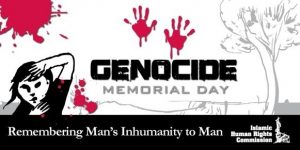On 19th January 2025, the Islamic Human Rights Commission (IHRC) hosted its 16th annual Genocide Memorial Day at the P21 Gallery in London. This year’s theme was “Resisting Genocide”, during which the speakers discussed ways to stand against these horrific acts. The event featured an engaging panel discussion with distinguished panellists: Professor Haim Bresheeth, Dr Ahmed Mofeed Mokhallalati, Revd Dr Stephen Sizer, and Dr Ghada Karmi.
The world’s first live-streamed genocide continues in Gaza, with every day revealing fresh horrors. The claim to championing universal human rights, so blithely trumpeted by the collective West, stands exposed in all its hollowness in front of Gaza’s bomb-blasted moonscape. Even after the International Court of Justice has ruled that there is a plausible genocide in Gaza, the West stands either complicit in or indifferent to the atrocities being perpetrated by Israel. Western complicity in the Gaza genocide is nothing new. Throughout history, wherever and whenever genocidal acts have been committed, the perpetrators have made great efforts to conceal, justify or dress up their crimes.
In the face of this industrial-scale slaughter and such overwhelming odds, there is still much that local populations can do. The right of resistance is a fundamental protection gouged into the tablets of international law. It is this theme of resistance to genocide which will form the theme of our next Genocide Memorial Day.
After opening the event with a brief recitation of the Qur’an, IHRC Trust chair Raza Kazim commenced by providing the translation of the Qur’anic verses. He then officially inaugurated the event by saying, “This Genocide Memorial Day feels different, very different after 15 months of what has been a live-streamed genocide in a way that we could not have possibly imagined when Genocidal Memorial Day commemorations actually started.”
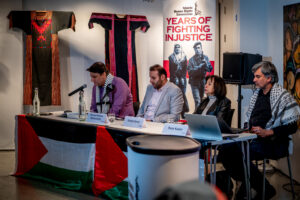
Raza reflected on what was going on in Gaza, especially the effect on children and juxtaposed that with his own position as a father. He then explained the aims and objectives of the GMD project.
“Genocide Memorial Day is a day remembering man’s inhumanity to man, which takes place in January each year. For the GMD, the act of remembrance is not limited by the backgrounds of the victims of any of the other genocides.”
He then highlighted how the event is firmly rooted in Islamic thinking and religious ethics. He was clear that it was an inclusive event, including members of all faiths and none. He then explained the politics behind who the West chooses to remember as victims of genocide and who it does not. This is another aspect of genocide remembrance that the GMD was set up to address. He then introduced the speakers and started the panel.
First Session
First speaker bio: Dr Ahmed Mofeed Mokhallalati
Head of Plastic Surgery department in Al Shifa hospital. Has eight months of frontline experience in Gaza genocide.
Dr. Ahmed El Mokhallalati is a distinguished plastic surgeon with extensive experience in burn reconstruction, hand surgery, and trauma repair. After several years of practice in the United Kingdom, he relocated to Gaza in early 2023, where he assumed the position of Head of Plastic Surgery at Al-Shifa Hospital, the largest medical facility in the region.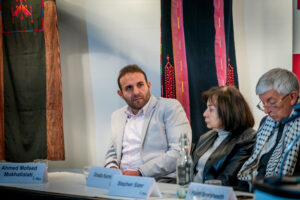
Throughout his tenure in Gaza, Dr. El Mokhallalati has been at the forefront of providing critical medical care amid challenging and often perilous conditions. His unwavering commitment to his patients was evident during periods of intense conflict, where he continued to perform life-saving surgeries despite shortages of medical supplies and the constant threat of violence.
In recognition of his exceptional humanitarian efforts and dedication to the Palestinian cause, Dr. El Mokhallalati was honored among UK Arab Figures of the Year in 2024.
Dr El Mokhallalati’s profound impact on the health sector in Gaza underscores his steadfast commitment to alleviating human suffering and advancing medical care in conflict zones.
Dr Ahmed Mofeed Mokhallalati began his talk by expressing his gratitude to everyone and clarifying the actual duration of his stay in Gaza.
“We tried, at that time, to do our best to improve the service there.”
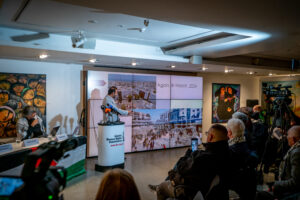
He explained what he used to do in terms of improving Gaza’s healthcare infrastructure before the start of the genocide. He helped develop a multidisciplinary team in Gaza, which brought together several charities to work together to develop the healthcare system.
“There were a lot of things that we were dreaming to do. We thought that, as Gazans, we should improve the service until we reach the level of providing training to the people.”
Dr Ahmed went on to explain how he now considers himself a genocide survivor before detailing his PowerPoint presentation, which includes images taken from Al-Shifa Hospital. He discussed the impact on the mental health of remaining in Gaza during the genocide, as well as his family circumstances. He also explained the systematic targeting of Gazan healthcare workers and the healthcare system as a whole.
“The people have no access to medical services, no ambulances, thousands of people died on the scene, we have no chance to reach them.”
Dr Ahmed provided an explanation regarding the initial concept of displacement, which international aid organisations advocated. Subsequently, he elaborated on the establishment of hospitals in these displaced regions. Dr Ahmed noted that healthcare officials frequently questioned the proposed plans; however, individuals employed by American agencies consistently take over the discussions. He subsequently presented statistical data concerning the number of hospitals that had been destroyed. Below, he delineated the actions taken by Israel concerning Al-Shifa Hospital;
“Just before leaving the hospital, they destroyed every vital structure of the hospital. They destroyed all the generators, the oxygen stations, the electricity and water supplies.”
Dr Ahmed stated that even though they stayed there, they were unable to provide any care. Their staying there was an act of resistance. He gave an excellent presentation on how Israel systemically destroyed Gaza’s health system as part of the genocide.
“Systemically, it was meant to collapse in full in Gaza.”
He shared how they persevered in their work under such challenging conditions, always focused on ensuring that Gaza has access to essential healthcare services system. After his presentation, Raza took a moment to reflect on Dr Ahmed’s talk, feeling inspired by Gazans’ incredible resilience. He expressed heartfelt gratitude for Dr Ahmed’s participation and welcomed Dr Ghada Karmi to the stage.
Second Speaker bio: Dr Ghada Karmi
Ghada Karmi was born in Jerusalem and was forced to leave her home with her family as a result of Israel’s creation in 1948. The family moved to England in 1949, where she grew up and was educated.
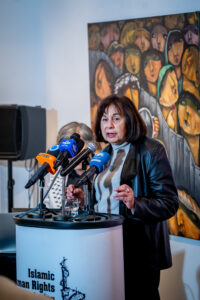
She practised as a doctor for many years working as a specialist in the health of migrants and refugees. She held a number of research appointments on Middle Eastern politics and culture at the School of Oriental and African Studies, and in the Universities of Durham and Leeds.
From 1999 to 2001 she was an Associate Fellow of the Royal Institute of International Affairs, where she led a major project on Israel-Palestinian reconciliation. In 2009, she became a Fellow of the Royal Society of Arts.
Currently Ghada Karmi is a Research Fellow at the Institute of Arab and Islamic Studies, University of Exeter. She lives in London.
Dr Ghada began by expressing her gratitude to the IHRC for organising the event and standing by the Palestinian people. She noted that the insights from the previous presentation reflect what we should expect from both the Israelis and the West. She wanted to focus on the future. She gently reminded everyone that a negotiated ceasefire deal had been reached. Then, she outlined the three stages of this agreement, concluding, “In effect, it’s really a prisoner exchange deal.”
It was clearly stated that, whilst welcome, this is not the end of the story. She then remarked that the deal is susceptible to Israeli interference at all stages. Concerning the Israeli government, she proceeded to say, “What you are dealing with is a treacherous, devious and ill-intentioned opposing member, so it’s actually very difficult to pin Israel down.”
She then mentioned the demonisation of Hamas and the racism employed by the media to keep the public misinformed, stating that we must pay tribute to the resistance. She sought to focus on the central point of her talk, which was to inquire about the future. “How do we see the future? What do we want to happen after this?”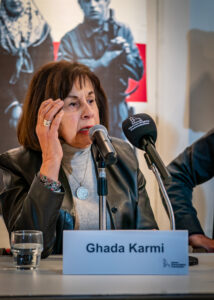
Dr Ghada began with the premise that accommodating Israel is not an option. Since Israel is neither reformable nor changeable, she argues that it must be dismantled. She then posed the question of how to achieve this dismantling. Despite the need for dismantling Israel, it is important to consider the future of Jewish-Israelis. She then goes on to answer the question by saying,
“If you do not want an Apartheid situation where one group dominates the other, don’t treat them in the way that you’ve seen in the last fifteen months if you don’t want that. There’s no other way than that you all have to live together, and you all have to do that in a democratic state.” She believes that this will change the nature of Israel. She also highlighted that the only way there can be justice for the Palestinians is in the One-Democratic state.
Raza then came back on the stage to thank Dr Ghada and end the first session.
Second session
Raza opened up the second session by sharing thoughtful reflections on our previous discussions, especially highlighting the important role of the resistance groups. He encouraged us to think about how we can support the resistance and advocated for our efforts to urge the government to de-proscribe these organisations. He then introduced the first speaker for the second session.
Third speaker bio:
Professor Haim Bresheeth-Žabner is a filmmaker, photographer and a film studies scholar, and a Professorial Research Associate at SOAS University of London. His books include the best-selling Introduction to the Holocaust, The Gulf War and the New World Order, and The Conflict and Contemporary Visual Culture in Palestine & Israel, special issue of Third Text . His films include the widely-shown State of Danger (1989, BBC2), London is Burning (2013) and Convivencia at the Turnpike (2015. His book An Army Like No Other: How the IDF Made Israel, published by Verso, 2020. See Verso Website, and Book website.
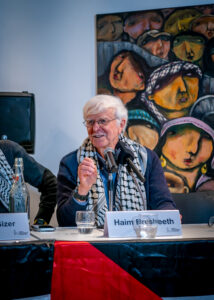
The next speaker was Professor Haim-Bresheeth, who thanked the IHRC for continuing to do the important job of speaking up about Gaza’s genocide and Palestinians.
He then expressed his respect for Dr Ahmed’s presentation and their determination to persevere. He mentioned that, like Raza, he continually thinks about the Palestinians, particularly since he has cancer and relies on medical services provided in the UK.
“Every day, I go and get this treatment, which prolongs my life. I know I would have been dead a long time ago if I were in Gaza,” he went on to share, which added even more weight to his point.
He called International Humanitarian Law a farce, to the point of calling it an illusion, and then explained how both International Humanitarian Law and Israel were created around the same time. He then discussed the history of the creation of the state of Israel and the role of the British Empire via the Balfour Declaration.
Professor Haim mentioned that along with the creation of Israel, the international community also established the “Convention for the Prevention of Genocide,” and then stated that if the convention was meant to stop genocide, then it has totally failed since there have been more genocides after its creation than before the convention. He also took aim at the ICC and the absurdity of its voluntary nature, as states can choose to join or not. According to the professor, the UN played a role in enabling the genocide by allowing Palestine to be partitioned in the first place.
He also discussed the so-called ceasefire negotiations between Biden and Netanyahu and how the US has contributed to arming Israel in its genocide against the Palestinians. The argument Professor Bresheeth presented is that, despite living in times when genocide is genuinely abhorred, largely due to mechanisms established by the UN, it is the very same UN member states that are complicit in Israel’s genocide, summarising the sentiment by saying: “What this means is the pretence of international law, the existence of International Order is the worst thing that can happen because it is very well designed to hide the vacuum that is now existing, created by Israel and the West.”
The speech highlighted the hypocrisy of applying the genocide convention or any form of international law when the perpetrator acts on behalf of the West. He explained his opposition to the PSC’s demand for merely a ceasefire, as this demand hides the real question regarding the genuine resolution of the conflict. He further discussed his belief that the Nazis would not have been able to execute the Holocaust had the world been aware of it, but the televised genocide in Gaza changed his perspective.
“This is International Law. It gives all the power to the powerful and gives nothing to the people who are the victims of the empire.”
He expressed the importance of explaining how international law helps to maintain the status quo. He discussed his views on the United Nations, suggesting that it might need to be re-evaluated due to its involvement in the actions of Israel, which he feels has not adhered to international laws concerning the Palestinians.
Professor Haim argues for Israel’s removal from the UN and supports the idea of a completely decolonised Palestine. Raza expressed gratitude to Haim for his presentation before introducing Revd Stephen Sizer.
Fourth speaker bio:
Revd Dr Stephen Sizer is the founder and director of Peacemaker Trust, a registered charity dedicated to peacemaking, especially where minorities are persecuted, justice is denied, human rights are suppressed, or reconciliation is needed.
Stephen served for 35 years as an Anglican priest, most recently vicar of Virginia Water until his retirement in 2017. He is now Bishop’s Chaplain to the Right Revd Riah Abu El Assal, the retired Anglican Bishop in Jerusalem. Stephen is chair of the Convivencia Alliance, a cross-faith, international initiative for a just peace in the Middle East, and in particular, a just coexistence in Palestine/Israel based on equal rights in One Democratic State (ODS).
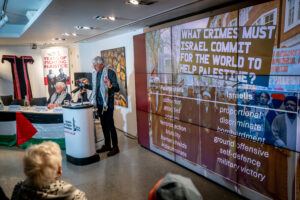
Stephen is coordinator for the 2024 Sabeel International Conference on Religious Extremism. Stephen is also a member of the Kairos for Global Justice Theology Group.
Stephen is on the steering committee of Campain. Campain exposes misrepresentation in public affairs and the news media. Campain is not politically aligned, and opposes misrepresentation on principle, and regardless of who is being targeted. Stephen was awarded an MTh from Oxford University in 1994. His thesis examined the Ethical Management of Pilgrimages to the Holy Land. In 2004, he was awarded a PhD by Middlesex University. His thesis examined the historical roots, theological basis and political consequences of Christian Zionism in Britain and the USA from 1820. In 2024 he received the ‘Courage Award’ for his campaigning for Palestinian rights from Mardin Atuklu University in Turkey.
He is the author of three books, In the Footsteps of Jesus and the Apostles, (Eagle,
2004) Christian Zionism: Roadmap to Armageddon (IVP, 2004) and Zion’s Christian Soldiers: The Bible, Israel and the Church (IVP, 2007) – now published by Wipf & Stock. His books have been translated into Arabic, Farsi, Korean and Spanish.
Reverend Stephen Sizer outlined the Church of England’s stance on the genocide in Gaza. In the past 15 months, the CoE has released five official statements regarding Gaza, after which the Reverend detailed the timeline of those statements. Regarding the first statement, Stephen said, “Significantly, the statement failed to provide any context in regard to the 75 years of colonisation, but the very next day, the Archbishop wrote to the CEO of the Board of Deputies to express his ‘deep sense of solidarity.” Even though the archbishop wrote to the Board of Deputies, Stephen pointed out that he did not write to any representative of the Muslim community or any representative of the Palestinians.
The second statement, which was probably released a week or two after the first, acknowledges ‘Palestinian suffering’, but there’s no recognition of why. Stephen explained how the archbishop failed to recognise the cause of the catastrophe or how the Palestinians have the right to self-defence.
The third statement came from the House of Bishops, which he described as being a deeply troubling statement that the Israeli embassy could have written. The Revd Stephen noted how Hamas revised its charter in 2017, which explicitly states that Hamas is not in conflict with Jews but with political Zionism. He then went on to debunk other allegations the bishops made in their statement.
In the fourth statement, the Church started to change its language. Stephen noted how the statement starts off with its “dismay at the violence, death and destruction in the place of our saviour’s birth.” Nevertheless, He said they insisted on “Israel’s right to self-defence”, and, he noted, in the fourth paragraph, they expressed mild criticism of Israel with the preface that Israel had a right to defend itself. Stephen explained that three months after the genocide, the CoE still refused to use legal terminology to define what was happening to the Palestinians adequately.
The CoE did not call on Israel to abide by international law, to call for boycotts, to end arms sales to Israel, etc. Stephen said they demanded that the UK employ a Dedicated ‘envoy or a minister for peace in the Middle East.’ Revd Stephen further went on to say that it was clear that the CoE wanted to stay in line with the Board of Deputies, which is why they did not use any legal terminologies such as genocide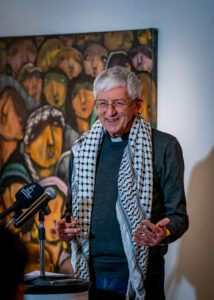
In regard to the fifth statement released “nearly a year ago” calls for an immediate ceasefire, but while referring to the ICJ, the statement did not use the term genocide. The statement still stated that Israel had a right to self-defence and fell within the two-sided paradigm.
To conclude, the Reverend summarised the statements issued by the CoE regarding the genocide in Gaza, and then he went on to say the following;
“There has undoubtedly been, as many have seen, an unhealthily close relationship between the leaders of the Church of England & the board of Deputies for British Jews who have described themselves on their website, unapologetically, as a pro-Israeli lobby.”
He then provided a summary of his findings, demonstrating how the CoE unequivocally supported the state of Israel during its engagement in a genocide.
The chair of the event, Raza Kazim, opened up the floor for Q&A, which covered all topics related to the issue of genocide in Gaza and the future of Palestine.
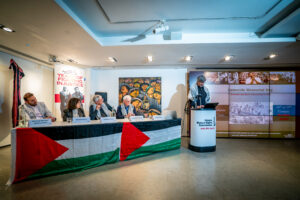
Raza read to the attendees a resolution which was passed on this year’s Genocide Memorial Day. The resolution reiterates that “Holocaust Memorial Day is not a symbolic exercise in remembering historical atrocities. At the heart of Holocaust Memorial Day (HMD) is the principle of “Never Again” – namely, that humanity must prevent the horrors of the Nazi Holocaust from ever happening again. But if we exclude the Gaza genocide, it renders that pledge meaningless. As religious leaders, we have a moral duty to uphold the sanctity of all human life, irrespective of ethnicity, religion or political conviction. We disavow, unequivocally, the unjustified killing of fellow human beings. We believe that all human life has equal value. There is no scale of human suffering by which any one genocide should rank higher than others.” The full text of the resolution is available to read here.
Once the resolution was passed, Raza read out the list of genocides, which can be viewed here.
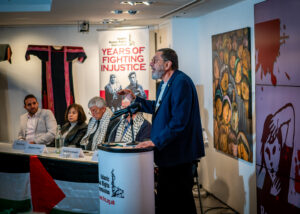
Massoud Shadjareh, chairman of the IHRC, concluded the event by thanking the panellists for their powerful speeches. He then reminded the audience that Genocide Memorial Day was set up to be all-inclusive and remarked that “we have to do everything in our power to make sure that never again is actually a practical commitment.”
You can watch the GMD 2025 here.

